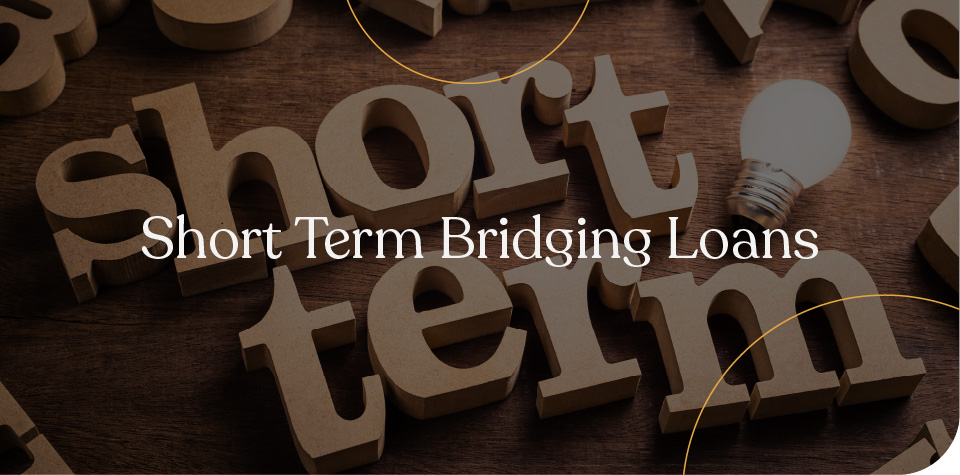
Short-Term Bridging Loans approved as quick as 24 hours for UK customers
There are many reasons why you might need an injection of cash that you intend to pay off quickly. You might want to buy a new home while waiting for your home to be sold. Or you may simply have some short-term cash flow issues you need to solve.
Whatever the reason, Loan Corp can help you get approved quickly with a lender in the UK. We work with over 200 bridging loan lenders in the UK who are ready to grant you the loan you need.
In this guide, we’re going to tell you everything you need to know about short-term bridging loans. We’ll examine how they work, who should get them, and much more.
Get approved for a short term bridging loan below win just 24 hours:
An Overview Of Bridging Loans
A bridging loan, also known as a bridge loan, is a type of short-term loan. People usually take out a bridging loan to help them with a new property purchase while selling their current property.
As with many types of secured loans, a bridge loan will be secured against a valuable asset such as your existing property. This means that if you cannot meet your loan repayments, your property could be repossessed.
A bridging loan secured against your property is known as a regulated bridging loan.
A short-term bridging loan means you have a short amount of time to pay off the loan amount. Loan Corp gets customers approved for both short-term and long-term bridging loans. If you’re looking for short-term finance, then we can negotiate with bridging lenders for you.
How Does A Bridging Loan Work?
There are several types of bridging loans that work in various ways. However, any kind of bridging loan you take out will be a secured loan.
First charge and second charge bridging loans
To take out a bridging loan, you must agree to a ‘charge’ being placed on your property. Charges are legal agreements that set out the order in which you’ll repay lenders if you can’t repay your loans.
This will be the first charge if you already have an existing mortgage on your property. If you then take out a bridge loan, this will become the second charge. This means the bridging loan you take out will be the second charge loan.
However, if you take out a bridge loan without already having a mortgage, then the bridge loan will be the first charge loan.
Fixed or variable rates
The interest rates on bridging loans are either fixed or variable. If you have a fixed rate, then the monthly repayments on your bridging loan will be the same for the duration of the loan. Fixed interest rates tend to be the more expensive option.
If a bridging loan has a variable interest rate, it means that your monthly repayments can change. This is why variable rate bridge loans tend to be less expensive than fixed-rate ones.
Open bridge loans
This is a good option if you want to use a bridging loan to buy a house you’ve found but haven’t sold your own house yet. Open bridge loans don’t have a set date by which they must be repaid. However, you’re usually expected to repay the loan within a year.
Closed bridge loans
With a closed bridging loan, you have a set date by which the loan must be repaid. Closed bridge loans are short-term, best suited to people selling their homes who need cash to buy their new property.
When Should You Get A Bridging Loan?
There are many reasons why people take out bridging loans. Usually, it’s because they need to borrow money in the short term whilst they purchase a new home. Let’s take a look at the most common reasons that people take out these loans.
Cash flow issues
If you’re experiencing short-term cash flow issues, a bridge loan is a good option. It’ll keep you financially stable until your cash flow issues are resolved.
Property chains
When you’re stuck in a property chain, you rely on money from your current property sale to confirm a new property purchase. A short-term bridging loan gives you the money you need to break free of this chain.
Auction properties
A bridging loan can help if you’ve bought a house at auction. You can use it to pay any upfront fees and secure the sale quickly. This is usually classed as auction property finance but is still a type of bridging loan.
Property renovations
If you’re planning to buy a property that mortgage providers have deemed uninhabitable, then a bridging loan can help. The loan can give you sufficient equity to renovate the property. It’ll then be in a mortgagable condition.
Once this is done, you can look at remortgaging the property or selling it.
Declined mortgages
You may be planning to buy a property, but you’ve been refused a mortgage. This could be because of your income level or bad credit. If you take out a bridging loan, you’ll still be able to buy the property. However, you’ll need to ensure you have an exit strategy.
The exit strategy in this scenario would be to switch to a mortgage when possible.
Things To Consider Before You Get A Bridging Loan
Before you take out a bridging loan, there are a number of factors to consider. You need to make sure that you can afford to pay it back and that you have an exit strategy. It’s also best to compare bridging loans from different providers before you settle on one.
Before taking out one of these loans, let’s examine the main factors you need to consider.
Short-term or long-term
Most bridging loans are short-term, but finding ones with longer repayment terms is possible. Make sure you choose the right term for you. Whether you choose short or long-term, you need to be sure you can pay off the loan within the specified period.
Secured loan
You need to bear in mind that a bridging loan is a loan secured against a valuable asset. This usually means your property. This means that you risk losing this asset if you fail to repay your loan. So, you need to be certain that you can pay back the loan that you take out.
Exit strategy
In order to qualify for most bridge loans, you’ll need to have an exit strategy in place. Generally, the better your exit strategy, the better your loan rates will be. Some examples of exit strategies are having a remortgage agreement in place or having an offer from someone to buy your property.
Bridging Loans Pros & Cons
Pros
- Flexibility: The repayment plans for bridging loans tend to be flexible.
- Speed: These loans allow you to borrow money very quickly. This could allow you to buy your dream home.
- Deferred payments: Depending on the type of bridge loan, you usually won’t repay it until the agreed repayment date.
Cons
- Fees: As with many types of loans, you might be charged fees. These can include process, admin, and completion fees.
- High interest rates: A bridging loan usually has a high interest rate.
- Valuable asset risk: If you’re unable to repay the loan then you risk losing the valuable asset used to secure it.
Can I Get Bridging Loans From The Bank?
Although it’s sometimes possible to get bridging finance from high street banks, it’s very difficult. The best way to secure this type of loan is to go through a specialist provider. This is even the case if you’ve been denied a loan by a bank due to bad credit.
Specialist bridging lenders in the UK will still grant you a bridge loan even if your credit history is bad.
How Long Does It Take To Receive A Bridging Loan?
The amount of time it takes for you to receive your money will vary depending on the lender. This is because different lenders have different criteria. Some lenders will send you the money within 72 hours but some might take a couple of weeks to send it to you.
As a bridge loan is a secured loan, it might take a bit longer to complete than a personal loan. This is because additional paperwork and checks are required to secure loans against your property.
To get an idea of timescales, it’s best to ask the lender for an estimate before you take out your loan.
Loan Corp works with lenders in the UK who can approve your loan within 24 hours and complete it within just one week. Using Loan Corp is the fastest way to secure your bridge loan.
How Much Do Bridging Loans Cost?
The costs of bridging loans vary depending on the lender. Usually, the types of fees you pay are:
- Arrangement fees
- Admin fees
- Legal fees
- Valuation fees
- Broker fees
What Are The Alternatives To Bridging Finance?
If you’re looking for bridging finance then Loan Corp can help to find you a bridging lender. However, there are still other options if you decide it’s not for you. These options include:
- Guarantor loans: this is a type of loan where a family or friend agrees to repay your loan if you’re unable to.
- Borrowing from friends and family: this involves borrowing cash from a friend or family member instead of taking out a loan.
- Gifted deposits: this is when a friend or family member gifts you money to use instead of a loan.
Are Bridging Loans Right For Me?
A bridging loan can be a good option for anybody. However, you need to make sure that you’re definitely able to repay the loan in time. It’s also best to try and keep the loan term as short as possible.
If you’re not sure you’ll be able to pay off the loan, then it’s best to avoid a bridge loan.
FAQs
Do bridging lenders ask to see proof of income?
Generally, a bridging lender won’t ask to see your proof of income. This is because there aren’t usually any monthly interest payments involved in this type of loan. Once the loan has been cleared, this is when the interest will be paid.
What amount of equity do I need for a bridge loan?
The equity needed for a bridge loan will depend on the lender. Usually, you’ll need to have between 60-70% LTV to be approved for a bridging loan. However, it’s possible to find lenders that will accept a higher LTV.
Will lenders check my credit rating for a bridging loan?
Your credit history and credit score will always be checked by lenders before they approve a bridging loan. Although you may still be accepted with bad credit your loan rates may be worse than if you had good credit.
Final Thoughts
Short-term bridging finance is a great option for anyone who needs cash quickly. You may have some short-term cash flow issues or want to buy a house whilst your current house is being sold. In most cases, a bridging loan is the best way to secure the money you need to move forward.
At Loan Corp, we work with over 200 lenders in the UK and we can get your loan approved within 24 hours. What’s more, many of the lenders we work with will complete your loan within just one week. So, you can break out of the property chain and buy the home of your dreams.
Sources
https://www.bridgingloans.co.uk/
https://www.gocompare.com/loans/bridging-loans/
https://www.moneysupermarket.com/loans/what-is-a-bridge-loan/

